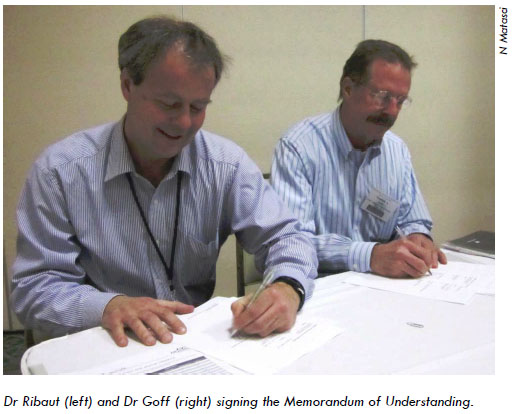A powerful new partnership in plant science
- Friday, 21 January 2011 00:00

SAN DIEGO, CALIFORNIA, USA – The Generation Challenge Programme (GCP) of the Consultative Group on International Agricultural Research (CGIAR) and the iPlant Collaborative signed a joint Memorandum of Understanding (MoU) on 17 January 2011, in San Diego, California, USA. Under the terms of this MoU, iPlant will collaborate with GCP in developing GCP’s Integrated Breeding Platform (IBP), including hosting a team of GCP software engineers (see vacancy announcements for these positions). ![]() Download PDF | HTML
Download PDF | HTML

MEDIA RELEASE – 21 JANUARY 2011
A powerful new partnership in plant science
SAN DIEGO, CALIFORNIA, USA – The Generation Challenge Programme (GCP) of the Consultative Group on International Agricultural Research (CGIAR) and the iPlant Collaborative signed a joint Memorandum of Understanding (MoU) on 17 January 2011, in San Diego, California, USA.
Under the terms of this MoU, iPlant will collaborate with GCP in developing GCP’s Integrated Breeding Platform (IBP), including hosting a team of GCP software engineers (see vacancy announcements for these positions).
“IBP’s collaboration with iPlant is a winning combination,” said Dr Stephen Goff, iPlant’s Project Director. “The community and partnerships that the IBP brings together through GCP pools extensive global expertise in both conventional and molecular breeding technology.”
The IBP is mainly funded by the Bill & Melinda Gates Foundation. Other funders include the European Commission, and the UK’s Department for International Development (DFID). iPlant is funded by the National Science Foundation, USA.
“One of the biggest constraints to the successful deployment of molecular technologies in public plant breeding, especially in the developing world, is a lack of access to informatics tools to support sample tracking, breeding logistics, data management, analysis and decision support,” observed Dr Graham McLaren, IBP’s Project Manager. “The iPlant cyberinfrastructure [CI] will allow us to develop and deploy an Integrated Breeding Workbench which will be configurable to different breeding workflows and provide the informatics support and analytical pipeline required for integrated breeding. In addition, the collaboration will give breeders throughout the world access to the products of upstream biological research necessary for effective molecular breeding.”
iPlant will benefit from close interactions with the highly experienced breeders from the international Centres of the CGIAR, while IBP will gain by building on the iPlant CI platform that many plant biology researchers will use for discovery research. iPlant collaborators will also benefit by gaining access to the users in the CGIAR and academic research organisations interested in supporting the humanitarian applications of the IBP, and to rich biological data which will be accessible through the iPlant CI for collaborative biological research. Taken together, such a coordinated effort will be mutually advantageous.
For more than a decade, the CGIAR and other partners have been working on developing the International Crop Information System (ICIS) and a fieldbook system for maize breeding. These systems will now be updated and merged for compatibility with iPlant’s CI platform, and to be scalable to the CGIAR’s new needs. iPlant is building a software developer toolkit (SDK) and application programming interfaces (APIs) and will work closely with IBP developers to facilitate building IBP’s Integrated Breeding Workbench on the iPlant CI.
“The Workbench and its data will be valuable components of iPlant’s Grand Challenge Project on correlating genotypic variation with phenotypic variation,” said Dr Goff.
 Targeted for priority development are tools for a Breeding Management System; tools for a Field Trial Management System including an Integrated Breeding Fieldbook; and tools for a Decision Support System including a Molecular Breeding Design Tool, a Cross Prediction Tool and a tool for marker-assisted recurrent selection (MARS).
Targeted for priority development are tools for a Breeding Management System; tools for a Field Trial Management System including an Integrated Breeding Fieldbook; and tools for a Decision Support System including a Molecular Breeding Design Tool, a Cross Prediction Tool and a tool for marker-assisted recurrent selection (MARS).
Dr Goff concluded, “Together, IBP and iPlant's efforts will create synergy between breeders, crop genetics and genomics experts, and computational experts to help drive state-of-the-art plant science discovery into applications that will greatly benefit humanity around the globe.”
The MoU was signed by Dr Jean-Marcel Ribaut, GCP Director, on behalf of GCP, and by Dr Goff for iPlant (see picture).
For more information, please contact This email address is being protected from spambots. You need JavaScript enabled to view it. (IBP) and This email address is being protected from spambots. You need JavaScript enabled to view it. (iPlant).
About the CGIAR Generation Challenge Programme (GCP)
Created by the Consultative Group on International Agricultural Research (CGIAR) in 2003 as a time-bound 10-year Programme, the mission of the CGIAR Generation Challenge Programme (GCP) is to use genetic diversity and advanced plant science to improve crops by adding value to breeding for drought-prone and harsh environments. This is achieved through a network of more than 200 partners (as of 2009) drawn from CGIAR Centres, academia, regional and national research programmes, and capacity enhancement to assist developing world researchers to tap into a broader and richer pool of plant genetic diversity. In this way, GCP strives to ensure that crops improved by cutting-edge research will reach farmers in the developing world. In Phase I (2004–2008), GCP worked on 18 crops, while in Phase II (2009–2013), the main focus is on improving seven key crops for drought-tolerance.
Funding: GCP’s annual budget of about USD 15 million is supported by the generosity of various funders, most coming through the CGIAR. In Phase I, our major funders were the European Commission, the UK’s Department for International Development and the World Bank. The Bill & Melinda Gates Foundation has become a major funder In Phase II, alongside these three continuing funders. Collectively, the four contribute about 90 percent of GCP’s total income.
About iPlant
The iPlant Collaborative, a virtual organization, is building cyberinfrastructure to empower plant scientists, bioinformaticians, and computing experts to tackle grand challenges in plant biology. Cyberinfrastructure unites high-end computing, large scale data storage, networking, software tools, and people to enable new exploration and knowledge discovery. iPlant’s cyberinfrastructure products will simplify how researchers and software developers bring together their data and tools to enable new conceptual advances through computational thinking and analysis.
Funding: The iPlant Collaborative is funded by a grant from the National Science Foundation Plant Cyberinfrastructure Program (#DBI-0735191).


